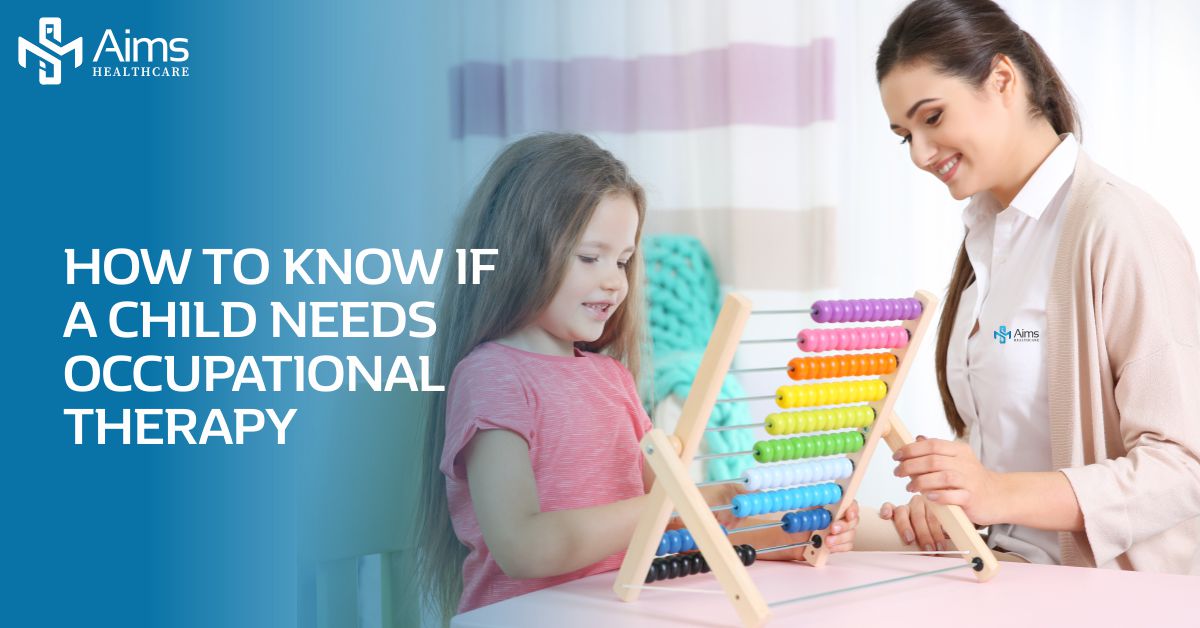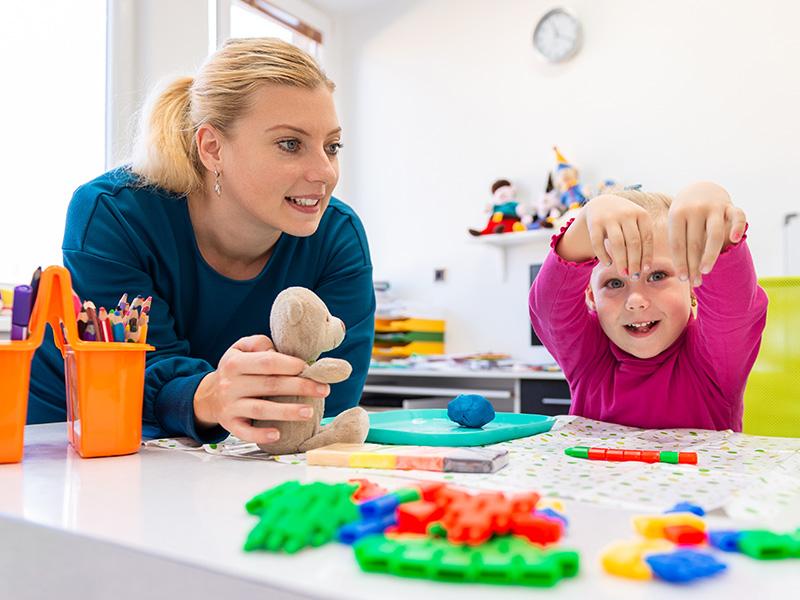
What Is Occupational Therapy For Children?
Whether you’re a first-time parent or have a couple of grownups to look after, parenthood does not come easy. In times of distress or uncertainty, you might have even thought to yourself, “This too shall pass!” However, when you find yourself supporting your kids more than they should need at that age, it’s natural for your worries to mount.
While some children find themselves progressing within the usual timeframe, your child might face issues that halt or slows down their progress. In such cases, seeking out a pediatrician and getting all the information you need to process the situation will help both you and your child deal with it better.
Short-term interventions, periodic assessments, and monitoring your child’s overall development is the aim of occupational therapy when you find yourself concerned about their overall growth. Occupational Therapy (OT) for kids essentially involves the improvement of their performance in daily activities at both school and home, even if it is as simple as using a pencil to finding their way home without help. All occupational therapists make sure that they involve the parents, teachers, and caregivers to help the children participate in all activities and find their place in life.
Today, you will learn about Occupational Therapy for children in detail and understand the challenges all the kids face, especially in today’s world, in helping them cope with it better.
Does My Child Need Occupational Therapy?
Over the years, every child develops different skills that help them function well in their daily lives. However, when this development is either stunted or slow, you as a parent need to ensure that you get the right help and make sure you minimize these challenges for your child. But how would you know if your child needs occupational therapy?
The following signs will help you figure out the needs of your children and seek occupational therapy in case you find them struggling in some aspects of their lives:
- Developmental delays, such as your child not being able to crawl at the age of one or unable to walk steadily at the age of two, can get termed as a sign that your child may need Occupational Therapy. You could also notice other red flags that point towards your child being a late bloomer. Either way, you should check with the pediatrician on possible issues
- If your children struggle with fine motor skills like strength and control, it’s another sign that they might need Occupational Therapy. If you don’t seek help from the pediatrician, you will find your child struggling with essential activities like writing or using computers
- Walking, jumping, hopping, or playing catch are the usual activities for kids. However, if your child’s gross motor skills are taking time to develop, he/she may find it difficult to perform any of these tasks, thus suggesting the need for occupational therapy
- In some cases, if you find your children to overreact to touch, taste, sounds, or smells, it’s a common sign that they could have sensory processing issues calling for the need for occupational therapy
What Challenges Does Your Child Experience?
Inability to focus, poor motor skills, typing or writing difficulties, and underreaction or overreaction to stimuli are some of the challenges your child might experience, thus pushing for the dire need to seek occupational therapy.
In most cases, early intervention helps, and your child can eventually develop strength and age-appropriate skills. Occupational Therapy plays a prime role in improving a child’s ability to focus and learn in school and apply those learned skills at home as well. If you find your child experiencing the following difficulties, here’s what you can do and how occupational therapy helps.
Developmental Delay
When your child finds themself unable to perform or develop skills at that age-appropriate level, you can consider him/her experiencing a developmental delay. It is usually a combination of skills that get considered under this category, and if you find your child unable to:
- Sit, crawl, or walk at a specific age
- Learn at an age-appropriate level
- Develop play or social skills
Then, you should seek occupation therapy for your child. Occupational Therapists will help your children with tools and assistive devices that they need to develop different skills.
Fine Motor Skills
Fine motor skills involve the use of small hand muscles. When there’s a lack of strength, motor control, and ability, your children might have difficulty drawing, using a pair of scissors, or stringing beads together. Such delays, if not addressed on time, will make academics – turning pages, writing or typing, using a computer – that much harder.
Occupational Therapists employ many fun techniques to help develop children’s fine motor skills. For example, a dot paint activity helps develop control and skill, and the thumb-and-finger hold assists in using a pencil or fork. Even popping the bubble-wrap helps strengthen a proper grasp, along with hand-eye coordination.
Gross Motor Skills
When an issue of the development of gross motor skills arises, your child might struggle with basic things like balance, coordination, strength, and endurance, all of which have a direct impact on walking and climbing stairs to jumping and throwing a ball. Such problems can keep kids from participating in sports, which can, in turn, affect their social skills and self-esteem.
You will often find Occupational Therapists asking children to throw and catch balls of various sizes and weights in addition to obstacle courses to help with balance and coordination. On the other hand, they suggest riding a bike to build strength and endurance.
Visual Processing
Interpreting visual information should come easy to kids once they reach a certain age. However, if they find it hard to process what they see and make sense of it, they could well be experiencing issues with visual processing. In some cases, your child may find it challenging to:
- Understand the spacing and sizing of letters
- Copy shapes or letters
- Find objects among other objects
- Copy from the blackboard or paper
- Understand the concept of left and right
By adopting different techniques that help with the development of visual skills, occupational therapists help children gain the understanding and knowledge they need at a specific age or within a timeframe.
Oral Motor/Oral Sensory Skills
During the growing years, your child should develop and control muscle movement in the face and oral area. However, when you find him/her:
- drooling excessively
- having difficulty using a cup or drinking from a straw
- feeling tired after eating
- chewing excessively
- mouthing toys beyond an appropriate age
It’s a sign that your child’s oral motor and oral sensory skills are taking time to develop. In such cases, reach out to a pediatrician or an occupational therapist who will encourage your child to develop the necessary skills for that age, thus helping them cope with their struggles and challenges.
Sensory Processing
If your children have trouble modulating sensory input, they may experience hypersensitivity, hyposensitivity, or both. It can reach an overwhelming degree, both at school and at home.
Occupational therapists may add sensory breaks into your child’s day, allowing him/her to walk around, stretch, and even do jumping jacks at regular intervals. Products, such as fidgets and chewable pencil tops, may also provide a calmness to help children sit and focus.
Social Interaction Skills
Developing relationships, making friends, and creating a bond with others is what social interaction is all about. However, if your child finds that challenging, he/she might have trouble with these skills, which is where an occupational therapist comes in. By creating an environment that helps your kids develop this ability, Occupational Therapists will assist them in reaching out to others and maintaining those bonds.
Learning Challenges
You must consult an occupational therapist if you find your child having trouble with the following:
- Unable to focus at school
- Difficulty in understanding instructions
- Hyperactivity or low energy
- Not able to cope with schoolwork or homework
- Poor impulse control
Do not let these learning disabilities cause a hindrance in your child’s development and find the right help at the right time.
Play Skills
Play skills can develop into self-help skills and also help your child gain confidence, problem-solve, and work on social skills. However, you should know that all children are different and develop these skills at their own pace. But, if you think your child struggles with adopting skills like exploring toys, participating in games, or playing with siblings or friends, you should contact an occupational therapist
Importance And Benefits Of Occupational Therapy For Kids
You cannot understate the importance of occupational therapy for kids. The benefits it offers to kids in helping them lead a healthy, fulfilling life are plenty. The idea of kids being able to carry out all the tasks at hand with ease is what drives the Occupational Therapists to do the needful. You can take a brief look at what Occupational Therapy does for the kids in terms of improving their overall life.
- Occupational Therapy provides aid to children facing difficulties in daily activities, such as brushing their teeth and hair, dressing up, using the bathroom, writing, drawing, and many more. This therapy helps your children develop these self-help skills.
- If your children have sensory processing issues and are unable to synthesize information in the basic five senses – sight, smell, touch, hear, and taste – occupational therapy can help them regain these skills.
- The Occupational Therapists can teach your kid to use the wheelchair if they suffer from physical deficiencies, and help them make the class on time, get things from the cafeteria, and much more.
- Occupational Therapists may use different sets of methods and plans if your children have sensory processing disorder. They could include activities that help with interaction, puzzles to develop coordination and awareness, and more.
- Occupational Therapy helps with gross motor skills and fine motor skills as well. If your child has trouble with these skills, they may experience difficulty in walking or bicycling. You can use occupational therapy to deal with the condition and eventually do away with it.
Summary
Remember, as a parent, do everything you feel you should in addressing concerns about your child. If you notice some different quirks or find your child behaving differently than usual, check with doctors and teachers for advice and the steps forward. Consultations, evaluations, and early interventions will help your child accept occupational therapy with the most ease.
You should consider Occupational Therapy if your child shows any troubling signs and have them enrolled in short-term therapy for either speech-related issues or otherwise.
Get Occupational Therapists At Home
If you’re in Dubai and seeking out occupational therapists in the city for your child, you can reach out to Aims Healthcare. We cater to a diverse range of medical assistance in the comfort of your home. Our qualified and certified medical professionals ensure that your child’s recovery and health are the top priority. Therefore, if you wish to avail of the occupational therapy services at Home in Dubai for your children and other medical assistance of Aims Healthcare, get in touch at +971 505 136 505 or fill this form and one of our dedicated team members will contact you at the earliest.
Aims Healthcare
Aims Healthcare intertwines superior medical practices with accessibility of highly qualified medical professionals to yield exceptional patient care and clinical outcomes. We take medical care one step further by providing first-rate home healthcare and doctor-on-call services at your doorstep. We are available any time of day for you and every member of your family.
Get Better With Aims Healthcare!
